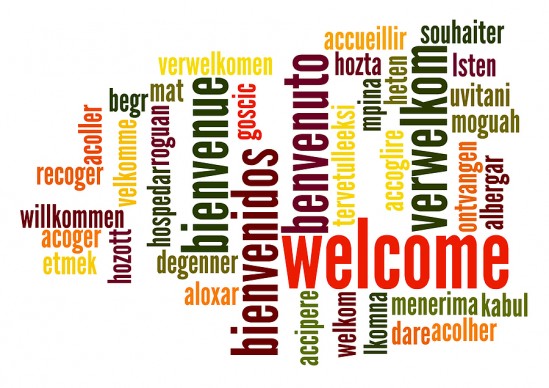The running joke in Europe is that you can always tell who is American: they only know one language. I suppose when one lives in the epicenter of the world’s international language, it may be hard to conceive that one should learn someone else’ native tongue. Christians, however, should be the first in line to show the import of foreign language learning.
The great communicator is God Himself. The Almighty’s speech generated creation out of nothing (Gen 1:3). In establishing humans as co-rulers of the world (Gen 1:28) God’s image bearers were able to communicate with their Creator and each other (Gen 3:8; cf. 2:16-17, 23). Sin disrupted relationships that changed openness and transparency (2:25) to deceit and rebellion (3:6, 9-14; 4:8-9; 6:5). The incident at The Tower of Babel was the final straw.
Fragmentation of the human race was a result of human sin. God’s original intent was that the earth be “filled” (Gen 1:28). Man, contrary to the divine command to “scatter”, erected cities (Gen 4:17). Humans are quick to forget God’s judgment (Gen 6-9) and even after the flood used their “oneness” of vocabulary (11:1) against The Creator. To stop the unified assault on heaven (11:3), dispersion came by way of confusion. Nationalism, spawned by language barriers, is God’s present answer to consolidated, worldwide rebellion. [1]
Yet in judgment there is hope. While people were scattered, God’s message to every tongue was to come through Abram (Gen 12:1-3): the immediate response to Babel. Human unification under God’s headship was made available again by means of language. Acts 2:1-41 explains the event of “spiritual” Pentecost. The “firstfruits” of The Church were brought together with the unifying power of one message for a diversity of international “tongues.” God worked within His own judgment of fractured communication to establish His Church. Though speech patterns may differ, believers are one in “The Word” (John 1:1; Gal 3:26-29; Eph 3:14-21). [2]
So Christians are people of “The Book”. Words are imperative to communicate truth (cf. John 1:14, 18). Petitioning prayers are created with words; people on their knees safeguard language use with every cry to God. [3] Salvaging antiquities’ greatest texts took place in Irish monasteries during the Middle Ages. [4] Freeing people by teaching Indian dialects was the work of missionary philologist William Carey. [5] Preserving languages of people groups around the world owes a large debt to Wycliffe Bible Translators. Christian institutions should set the standard, be the best place to cultivate the devotion of language learning for the following reasons:
(1) Love Learning another’s native speech demonstrates openness and the giving of gifts to another. The Christian has the best basis for love’s source (God Himself) and the most obvious rationale for its definition—unconditional sacrifice for others (1 Corinthians 13:4, 5). Love breaks down cultural distance and nationalism. Love creates opportunities to help cultures, languages, and people groups. [6]
(2) Humility Learning another language implies one does not know it all. Others are attracted by a person who moves to their level (cf. Phil 2:1-11). Humility breaks down cultural arrogance. Humility creates unassuming, meek servants. [7]
(3) Freedom Words carry moral clarity. Words capture ideas translating them to principles, changing the way people think and live (cf. Deut 4:5-8). While sensitivity is shown to cultural differences, they are distinct from and subservient to universal law. Freedom breaks down authoritarianism. Freedom creates a platform for ethics, justice, and peace.
(4) Unity Language study shows the derivation of dialects from one shared source. Common features demonstrate our common origin (Acts 17:26; 1 Co 15:44-49; Eph 3:14-15). Scripture honors differences while exhorting unity (Eph 4:1-6). [8] Unity breaks down diversity, misunderstandings, stereotypes, prejudice, and bias. Unity creates mutual goals.
(5) Knowledge Acquisition of knowledge is God’s ideal for His creatures (Prov 8:10-11; 20:15). Stable wisdom is obtained through language learning. Knowledge breaks down ignorance and hatred. Knowledge creates economic opportunity and stability.
In Acts 2 God made a statement about the importance of foreign language learning. He made sure everyone heard The Gospel in a tongue they could understand. If communication for care, compassion, and comprehension is important to God, shouldn’t it be important to His people?
First published in 2001 for the ACSI Biblical Integration Enabler Series, Mark has encouraged all his students for years to learn another’s language. Mark’s son Tyler knows German, his daughter knows Spanish, and he himself has been dabbling in Hebrew and Greek for years.
[1] Mark Eckel, Biblical Integration: Understanding the World through The Word. Self-published. 1997, 2001, p. 44.
[2] Ibid, p. 44.
[3] I am indebted to my colleague Michael McDuffee at Moody Bible Institute for this idea.
[4] Thomas Cahill. How The Irish Saved Civilization. (New York: Doubleday, 1996).
[5] Vishal and Ruth Mangalwadi, The Legacy of William Carey: A Model for the Transformation of a Culture. (Wheaton: Crossway, 1999), pp. 91-92.
[6] See David I. Smith and Barbara Carvill, The Gift of the Stranger: Faith, Hospitality, and Foreign Language Learning. (Grand Rapids: Eerdmans, 2000).
[7] See Bernard Lewis, What Went Wrong? The Clash Between Islam and Modernity in the Middle East. (New York: Harper Collins, 2002). Lewis argues that one of the reasons for Muslim loss of power was a refusal on the part of Arabic speaking peoples to learn anyone else’s language. Because Europeans were considered infidels, their dialect was consigned the status of a useless commodity.
[8] Eckel, p. 44.

